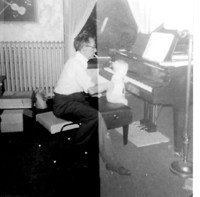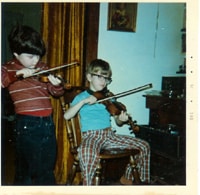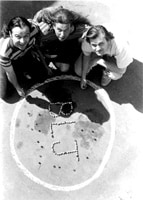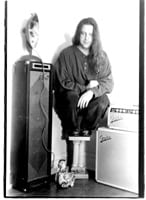|
ABOUT
ENGINEERING. . . AND HOW I "GOT HERE"
THE
BEGINNING-
The
name's James, and I was born in Duluth, MN way back in 1970.
My father was a musician- a violinist by trade- as was my
mother, who plays drums in a band and still plays more gigs
every year than I do. . . or ever did, for that matter.
My older sister was trained as a pianist, and many members
of my extended family on both sides work in the industry
as musicians, teachers, and productions folk. Check out
the credits on enough major motion pictures and you're sure
to stumble across the name "Matheson" much sooner
than later. For even more fun, try Googling the name. Makes
for an interesting read, at least it does for me.
|
|
|
My
musical training began at a very early age, but I didn't
take to it very well. I was started on violin in the Suzuki
style, then shifted to piano, then back to violin. In the
early years of my life all music was classical in nature-
as this was my father's concentration- but thanks to my
mom I was also exposed to Harry Belafonte, Johnny Cash,
The Kingston Trio, Marty Robins, church music, various broadway
productions, and a pile of vinyl- most of which escapes
me now. Later on, my older sister turned me on to more contemporary
music, but I think somewhere in the confused mess of a little
boy's mind I was always most intrigued by the open reel
machines that lined the walls of my family's living room-
along with two grand pianos and a small handful of microphones.
You see, my father was an engineer as well, recording anything
that he could get his mitts on, and in the later years of
his life it was all that kept him going. At a certain point
he came to love it almost more than playing the music himself.
I learned a lot from my old man about recording, but that's
not to say that he ever knew I did.
|
|


|
ENTERTAINMENT-
The
technical aspects of musical instruments eluded me for many
years, but to be fair we're talking about the ages of 18
months to five or six years old, so I forgive myself for
that. Eventually I found my place in vocal performance,
and spent many happy years singing the ears right off myself.
I still croon when I've got a little time to spare. My "purely
vocal" career lasted roughly from the age of six until
I was 12 or so, culminating in local productions of the
operas I Pagliacci and Cavallera Rusticana.
By the age of 10, though, I had discovered my mother's old
Harmony Hawaiian- styled acoustic guitar stashed away in
our attic, and that coupled with a few friends who were
taking lessons sent me along a different path that wove
in and out through the course of my teenage years.
|
|
By
the time I was a senior in high school I was in my first
band- a punk rock outfit called Mr. Hooper Is Dead- and
was writing original songs and instrumentals as a guitarist.
I never really took to the "cover band" thing,
but then it was the '80s, and it was true that we really
could all write better music than pop radio was feeding
us. From that point on, the writing of original music became
a passion for me, and with the exception of a few "ill-
conceived" projects that couldn't really hold me I've
been involved exclusively in original music ever since.
Mr. Hooper Is Dead didn't get very far. We played one show,
got a popular entertainment writer for our local paper fired
(inadvertently, of course!), and broke up. But life went
on.
|
|
Fade
to the college years, and a few more bands, but really the
only group worth mentioning was a little outfit called the
RPMs. We weren't a particularly gifted band- with the exception
of our lead guitarist, who was literally ahead of the curve
on the speed metal bands that rose to popularity just a
few years later- but we were good enough to get signed to
our first label. It was 1989, and Pendulum Records, a small
label in Minneapolis, MN picked us up for a few months after
hearing nothing more than our demo tape. Ironically enough,
when Pendulum fell apart so did we. Never even did a record
for them, although only a handful of their bands ever actually
did- most notably a group called Mile One, whom I still
recommend highly as "a band of the late 1980s"
who clearly stand the test of time. Incidentally, we weren't
a speed metal band, either.
|
|
|
It
didn't take much after that. I did a short stint with a
band called Artwork Red, and then the years blossomed into
the time of Pandora's Truck, a band that made all the difference
for everyone involved. Pandora's Truck never courted label
interest of any sort. We bickered so heartily amongst ourselves
that we barely got any recording done, and never even released
a single. But music fans came in droves to see us do it.
Word of our band got out quickly, mostly thanks to our opening
set for Chan Poling- the keyboard player for a popular Minneapolis
band called The Suburbs. We made piles of money when we
played (most of which was already spent, I might add), had
more fun than is literally legal these days, and with the
exception of two or three songs we played three solid hours
of original music. We had a ball, and it was utter misery.
|
|
|
I
felt pretty lost when Pandora's Truck finally disbanded.
I bounced around into and out of a couple of recording projects
until in 1993 I finally burned out, quit my "day job,"
bought a one- way ticket to Amsterdam, and hopped on an
airplane with my acoustic guitar on my back. What followed
was the better part of a year spent traveling around Europe,
playing guitar with and for the people I met there, and
experiencing some of the most amazing things and people
that a person can imagine. But sooner or later a person
has to come home, and so I did, at which point I returned
to college and settled in for the long haul.
|
|
But
one of those little pre- Europe recording projects had been
shopped around by my partner in the endeavor, and had received
some good press in northern California. Before we knew it,
we were getting letters from a little company called MGM,
telling us that although they didn't think we were ready
for the open market just yet, they definitely wanted to
stay in touch and track our progress. In the end nothing
came of it, as our personalities were too far askew. But
there we were, on the map again, and it didn't take long
before I was feeling "the itch."
|
|
1995,
and the peak of the Duluth, MN original music scene. Of
course, some would dispute that, but if you weigh all the
factors it's a pretty safe assertion. I was playing with
my first trio, a band called Buddha Love Joy. We recorded
all of our original music, but never released a thing. We
thrived on the live performances and concentrated all of
our energies there. Much of our promotion centered around
performances of my Tape 13 project, which was my
introduction to the industry as a solo singer/songwriter.
Again, our music was all- original, and the highlight of
our road shows has to have been our opening slot for a band
called Slaughter at the now- defunct Pacific Club in Superior,
WI. Incidentally, BLJ wasn't a metal band, either. Our little
3- piece came to a screeching halt when our drummer moved
a little way south of Duluth, which led to scheduling problems
and our demise.
|


|
|
1999
was a rare- bird year, and found me struggling to finish
college and making plans for the future. A popular local
venue had changed hands, and the new owner approached me
to put together the first show in his newly remodeled main
room. For this venture, a new band was born- The Oscar Goldmann
Overthrow Initiative. Another three- piece, we wrote 10
songs and practiced up with the intention of playing this
one show only. Things ultimately went much further than
that.
|
|
|
The
show was a flop, mostly due to local political climes, but
the O. G. O. I. stuck it out a few weeks beyond that to
record the music that would later be housed on the first
album- Celebate Diversity. In October of that year,
I pulled up stakes and moved south to Minneapolis, MN.
|
|
The
Minneapolis years were productive ones, although no traditional
"bands" were formed then. I concentrated mostly
on my solo career, which culminated in the release of Headfriendly,
a full- length collection of "urban folk" songs
that featured performances by a number of musicians. . .
some that you've probably heard of, and some you definitely
haven't. The first O. G. O. I. album was released at this
time as well. In 2001, just as the Minneapolis job market
was beginning to sag a little, two songs from Headfriendly
and one tune from my collection of unreleased Buddha Love
Joy recordings were picked up and published in John Ervin's
production of the feature- length motion picture Vixen
Highway. Shortly after that I returned to Duluth, where
the members of the O. G. O. I. were waiting to take up the
torch again.
|
|
|
|
2001
was the year, and the O. G. O. I. began writing, playing,
and recording with an energy I'd never experienced before.
By APR02 our second CD- carpetbombing- was released,
and by JUL02 a label called Island/Def Jam out of New York
City was on the horn asking about tour dates and availability.
By October of that year it was all over- due to the loss
of our drummer- but man! What a ride, leaving behind a legacy
of tremendous shows- including our opening set for Molly
Hatchet- and the most satisfying and explosive CD I've ever
had the honor of performing on- carpetbombing.
If
you're interested in learning more about the O. G. O.I.
the website's still intact, and can be seen by visiting
http://www.ogoiops.com
and taking a left at the links.
|
|
2002
was also the year that I hit a fork in the road, and was
met with the opportunity to join up with a couple of partners
and buy into Ballyhaus Recording, the little Duluth, MN-
based studio where carpetbombing was recorded, and where
I worked for the next three years as production manager
and freelance recording engineer. Of course there were bands
over that time- IMJ, Adirondack- but engineering work kept
me very busy and afforded only limited opportunities to
think of appearing on stage again.
|
|
Ballyhaus
Recording became a phenomenal institution over those years,
but it also grew into a leviathan of a business venture.
In 2005, my partners discovered that they were overextended-
partially due to their attempts to diversify into the real
estate sales market- and needed to part ways with Ballyhaus.
It was a sad day when we decided that it was necessary to
close the studio, but happily we were able to find a new
owner who was willing to carry on and maintain the facility
itself. The studio space still stands and operates in- for
the most part- its original configuration, and has seen
a third turnover of owner/managers who continue to provide
practice rooms and some recording services to bands in the
Duluth area.
|
|
|
|
When
Ballyhaus Recording dissolved, I moved the studio to my
home in Duluth, MN and continued to make records under my
production company name- Randolph Manpart Products. A number
of upgrades to services were made, including an expanded
digital recording platform, improved monitoring systems,
and digital video transfer services. Many good recordings
were made there, and I was also able to expand into archiving
services- which I also enjoy a great deal. But in 2007,
I thought that I could sense something changing in the real
estate market and at the same time believed that I was looking
at an opportunity that I had been seeking for many years-
so I put my house on the market and sold it.
|
|
After
selling the house, I moved into an apartment while seeking
a new home. I continued to offer mastering and archiving
services on a limited basis, and drove literally hundreds
of miles looking at houses and properties. In the spring
of 2008 I finally found what I had been looking for- a house
on wooded acreage in rural Carlton County, MN. I made an
offer, struck a deal, and moved in early in June of that
year. I resumed offering more comprehensive services that
fall, but also began to envision a new business focus. After
much deliberation, I decided that this new focus was feasible
and justified the transition to Far Q Productions.
|
|
SO,
WHY ALL THE YACKITY- YACK?
I
mean, you're really just here to see some pictures of the
studio and equipment, right? Well, I guess it's for the
reason I stated way back at the beginning- people. I think
it's important that you know a little something about your
engineer and his or her background before you decide if
they've got what it takes to handle your project. That requires
some "straight talk," so here it is. Don't worry,
there's studio- info on this website too, and we'll get
to that in just a few more short minutes.
Throughout
my career as a songwriter and entertainer, I've always been
very hands- on with recording. . . in most cases engineering
or co- engineering those projects myself. I've heard (and
made) a lot of recordings and met a lot of musicians and
industry professionals, and of course the learning curve
on that kind of experience is very high. But as I look back
on my engineering career through Ballyhaus, I also see room
for improvement and it was with that in mind that I moved
forward with R. M. P. and, now, with Far Q Productions.
It's
true that Ballyhaus Recording will be remembered most for
it's uniquely "client- based" recording style,
but let's be honest with ourselves here- that's not always
the best of ideas. Another way to look at it is this: What's
the sense in paying someone "X" number of dollars
per hour and not making use of their skills and knowledge
with regard to product quality? There is no sense
in that, and while it's true that every one of us has a
sound that we're seeking, that doesn't necessarily mean
that we instinctively know how to get there every time.
Furthermore, it does no one any good to spend that time
and money to turn out a recording that's below par- not
you, not your engineer, and certainly not your fans.
However,
that's not to say that musicians and bands don't have a
place in the recording process- frankly they're absolutely
indispensable, and especially during the mixing and mastering
process! But I want each and every one of you to walk away
from the project with the highest- quality recording possible
while also suiting your tastes and needs. . . because our
work reflects upon each other- either positively or negatively.
So I think it's only fair for me to let you know that at
the point you're asking me to turn the bass up so loud that
the entire recording sounds muddy, for example. . . I'm
not doing it. I expect that you're hiring me because there's
something you're short of- equipment, experience, etc.-
and I expect that my accumulations of both will be put to
use.
Just
one or two more short notes here. First, please realize
that I offer my services as a recording engineer- not a
"producer," and there's a simple reason for that:
Being a producer sucks. It involves arranging songs and
monkeying around in other "band business" that
tends to leave everybody feeling a little jilted, and there's
no way that anybody in their right mind would walk into
a producer's job for the kind of money that I charge. So,
I listen very closely to your songs and let you know if
someone dropped a note or a beat, but I'm not going to deliberate
over song structure or lyrics with you- that's the job of
the artist, the engineer's job is to catch the sounds and
make them presentable and that's a tough enough job as it
is. If you want to hire me as your producer, go ahead and
inquire, but be aware that the annual salary I'll be asking
you for is enormous, especially since you'll probably fire
me after the first album.
Finally,
and with regard to rates and bids. I keep my rates very
low, folks, because I want you to be able to afford the
time it takes to "stretch your legs" and really
express yourselves in your recordings. From time to time
I also offer special deals that tend to be so ridiculously-
priced that I'm making nothing on them. Consequently, I
don't "cotton" to much monkey business when it
comes to money. I don't haggle, and I don't respond well
when people try it with me. Recording is how I make my living,
and I'm confident that the services I offer are worth much
more than the prices I charge. You don't place an order
for a cheeseburger at McDonald's and then "make an
offer," and I'd hope that people would treat their
recording engineer with at least as much respect as they
show to a fast food joint.
So,
on with the show! Let's take a look at the studio! Visit
the Studio
& Rates page for details regarding the facility
and the equipment it houses, or return to the top and use
the navigation bar to visit any other pages you are interested
in.
Top
|
|

